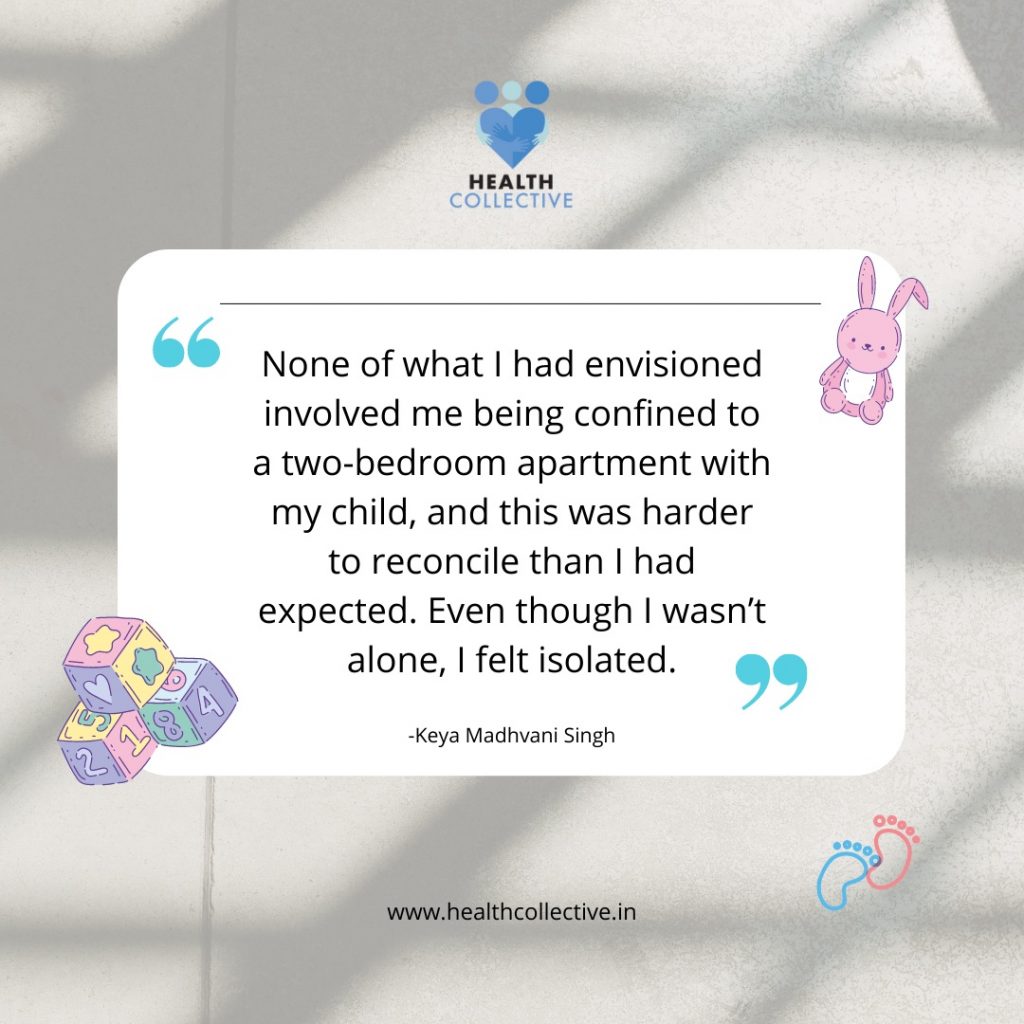A New Parent’s New Discomfort with Loneliness
By Keya Madhvani Singh
I’ve always been comfortable with being alone. I grew up as an only child with parents as dedicated to their careers as they were to me, with very few cousins and half the grandparents a kid should have. I grew to be comfortable with myself, with books and their make-believe worlds, music and often, the quiet.
On 24th March 2020, front doors across the country slammed shut. I was nine months pregnant, due any day, and excited to spend my maternity leave with my baby at home. Close friends who had recently become mothers told me the initial few months were challenging and beautiful. I used the first few days of lockdown judiciously, listening to podcasts as I folded laundry, reading parenting books as I tried to settle into a comfortable position in bed, and speaking to lots of family and friends on video calls as they expressed their love and support, wishing me well. I was prepared for everything — except loneliness.
I returned from the hospital four days after giving birth. I had a relatively easy delivery; my baby was born without any complications other than a mild case of jaundice which the pediatrician assured us was quite common and easily treatable. My baby was healthy, happy, and had the most beautiful brown eyes framed by long and dark lashes. Everything about my baby felt new and unfamiliar. My husband had two weeks of parental leave and my mother moved in with us for the first six weeks. Time flew by in a sleep-deprived blur.
After my mom moved out and my husband returned to work, things felt different. I could feel my chest tighten with panic as I said goodbye to my husband every morning. Being a doctor in a global pandemic with health institutions struggling to cope, there were many reasons why I should have been afraid to see him leave. Every morning I would bite my tongue to stop from yelling “don’t go”, but not because I was worried about him getting sick, but because I didn’t want to be alone with my baby.
This little baby who I was supposed to feel boundless joy to be with, felt foreign and scary to me, and his dependence made me feel lonelier than I had ever felt in my life. I used to count down the hours until my husband came home from work and if he was even a few minutes late, I would talk myself out of picking up the phone and calling him. I made a video call to the grandparents every day at 5pm, and I remember looking at the clock, waiting for the seconds to tick by, because it would mean I wouldn’t be alone with the baby. The quiet was disquieting.
ALSO READ:
One evening, when the baby was about two months old, my husband was running late from work. The hospital he worked with had put him in charge of managing a COVID-19 center. He did his best to return between 7 and 7:30 pm, but this day it was 8:30 and he still wasn’t back. The baby was having a bad evening and was crying inconsolably. I just couldn’t figure out how to calm him down. It had been an hour and I had tried everything. I remember calling my mother in a panic, and then collapsing in an exhausted puddle of tears. That’s how my husband found me – in a miserable, hopeless, lonely heap on the floor, with our baby beside me, finally peaceful in his rocker.

When I was pregnant, I had visions of how I wanted to spend the first six months of my baby’s life. We would go visit the grandparents, have playdates with friends, step out to grab a cup of coffee, go on a holiday and take him on his first plane ride. None of what I had envisioned involved me being confined to a two-bedroom apartment with my child, and this was harder to reconcile than I had expected. Even though I wasn’t alone, I felt isolated. I couldn’t express myself and I believed nobody would understand even if I tried. I told myself I was being silly. Nobody I knew had struggled like this with their baby, and so my feeling of inadequacy and uncertainty made me even more lonely.
After three months of confinement, I was determined to get out, if only for a walk downstairs. Even though I was scared to take him outside, I knew it was important and so talked myself into it. An hour before I left the apartment, I practiced by strapping him to the baby carrier and cradling him in my chest as I walked around the house, building courage for what felt like a giant step. He looked up at me with those bright eyes as he always had, and happily gurgled at me. It was as if the idea of being able to go outside started to set me free. I smiled, cuddled him tight and closed the front door gently behind me.
Our adventures to the building garden started to be the thing I looked forward to the most. As weeks went by, I shifted him from my baby carrier to a stroller. I pointed out the trees to my baby, talking to him about the clouds and the birds. Slowly, other mothers and babies tentatively ventured downstairs. Standing six feet apart, we made muffled conversation through our masks, and I started to feel less lonely.
In July, the monsoon arrived, and my parents and in-laws arrived at my door to visit. I gradually found myself looking at the clock less and looking into my son’s bright eyes more. I felt our bond deepen and I dreaded our time together less. In brief bursts, and then in waves, I experienced the undying, unconditional love I had expected to feel from the first day I brought him home. The knowledge of not being confined made me less lonely. My discomfort with loneliness was not easy, but as I eased myself out of it, my baby and I eased into our wonderful lives of comfortable loneliness together.
About the Author: Keya is a media and communications professional. She’s worked for global companies and has lived in Mumbai and New York. She loves learning about people and what makes them tick. In her spare time, she writes for her blog A Tale of Wander, and is always on the hunt for a good cup of coffee. Her latest adventure is discovering what it means to be a new mom. You can find her at @keyamadhvani on Twitter.
ALSO READ


